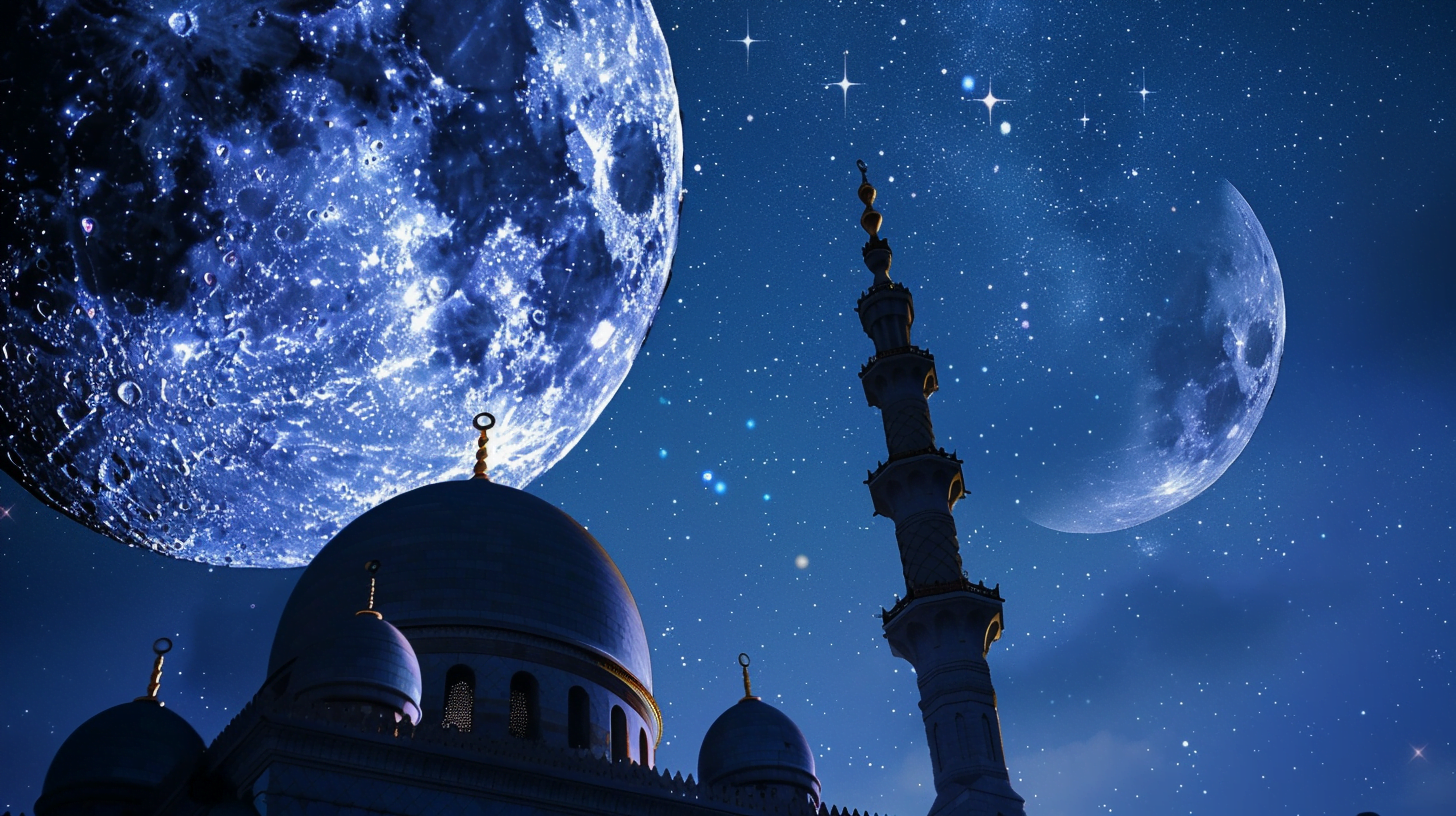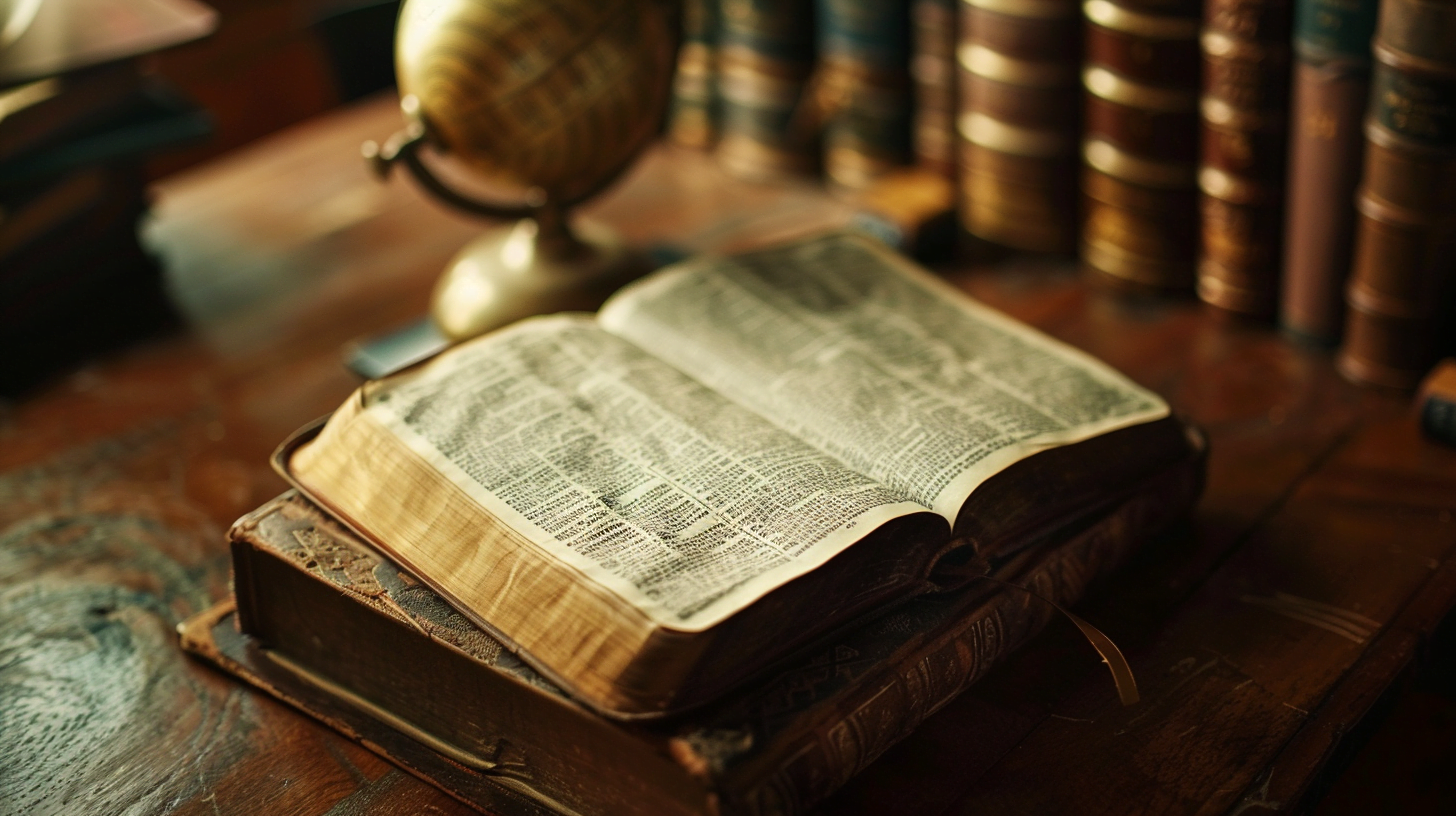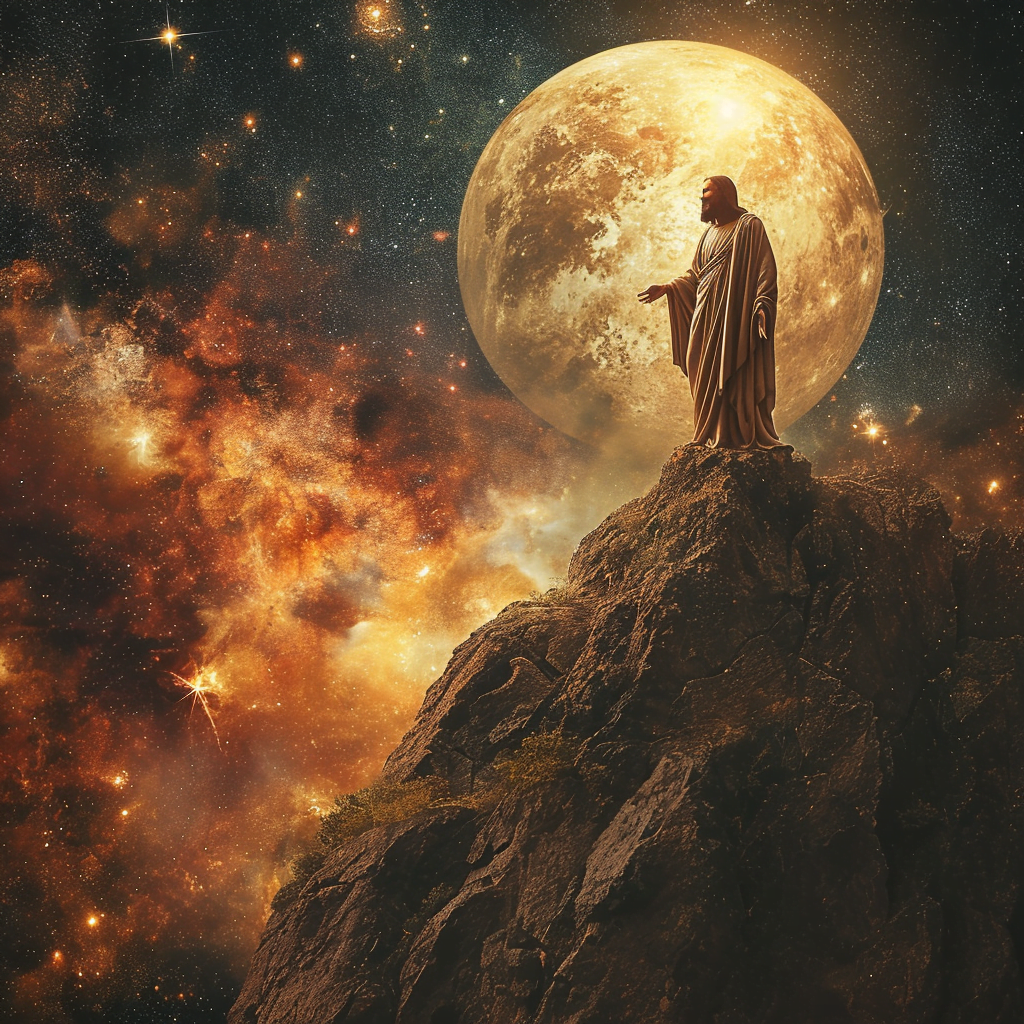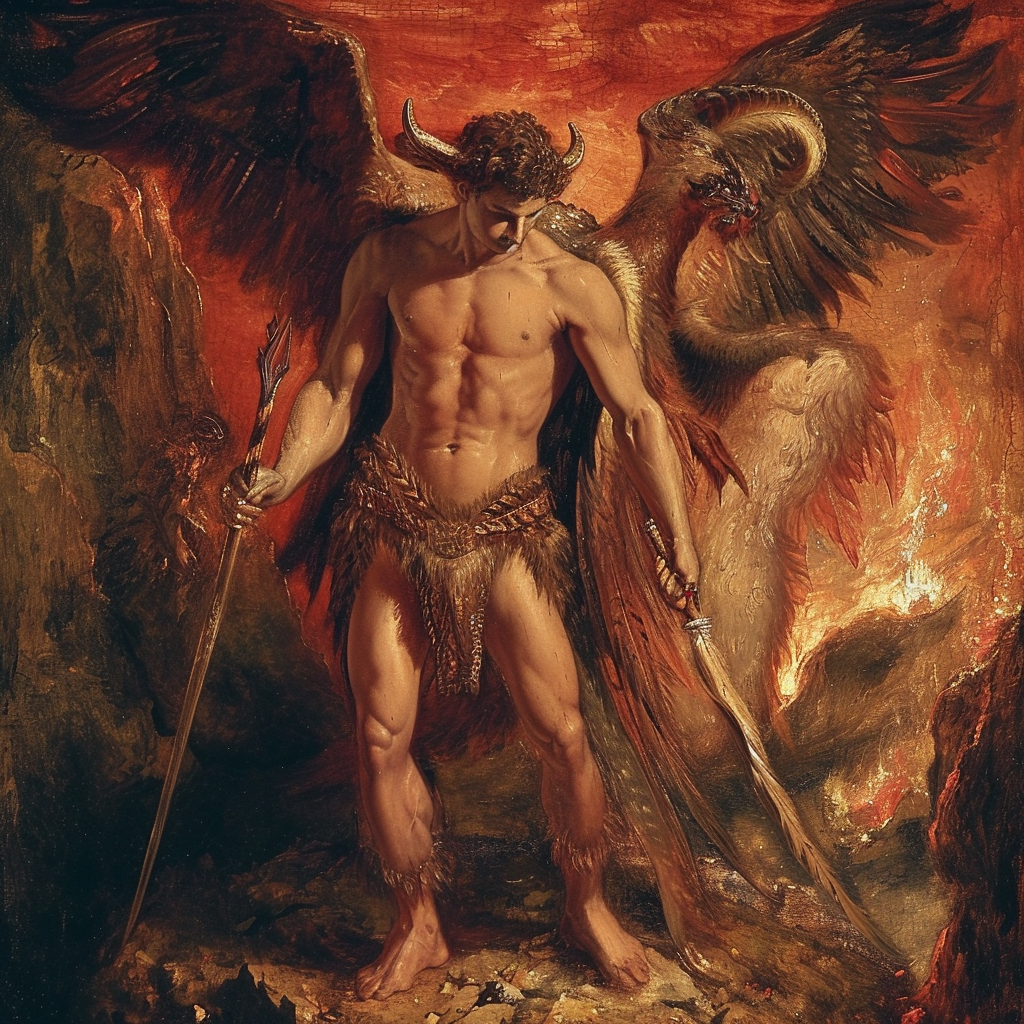Astrology has fascinated humanity for thousands of years. From reading horoscopes in magazines to checking zodiac compatibility on social media, people are constantly drawn to the idea that the stars and planets can shape their lives. It’s not just a modern-day obsession either—ancient civilizations like the Babylonians, Greeks, Persians, and Egyptians relied heavily on astrology to make decisions about harvests, wars, and even marriage.
But here’s the question that matters most for Muslims today: Is astrology permissible in Islam? Can a believer in Allah casually read their horoscope or rely on zodiac signs for guidance in personal decisions? Or is this practice considered haram (forbidden) and linked directly to shirk, the gravest sin in Islam?
To answer this, we’ll dive deep into the Qur’an, Hadith, and scholarly opinions, separating cultural myths from authentic Islamic views. This guide will not only explain whether astrology is haram or halal in Islam but also show why Islam warns against astrology, the dangers of believing in zodiac signs, and what to do if someone has practiced astrology in the past.
By the end, you’ll understand exactly where Islam stands on astrology and why the religion connects this ancient practice with weakening faith in Allah’s decree (Qadr).
Understanding Astrology vs. Astronomy in Islam
Before diving into Islamic rulings, it’s important to clear up one of the biggest confusions people have: the difference between astrology and astronomy. These two words often get mixed up, yet in Islam they carry very different implications.
What is Astrology?
Astrology is the belief that the positions and movements of celestial bodies—such as stars, planets, and the moon—can reveal information about human personalities, future events, or even destiny.
Examples of astrology include:
- Horoscopes based on zodiac signs, such as Aries, Virgo, or Pisces.
- Birth charts that claim to map someone’s life based on the exact time and place of birth.
- Compatibility readings that compare two people’s zodiac signs to predict relationship success.
The problem with astrology is simple—it gives celestial bodies powers over human lives that belong only to Allah. In Islam, only Allah has knowledge of the future and the unseen (known as Al-Ghayb). Depending on the stars instead of Allah creates a conflict with true faith.
As the Prophet Muhammad ﷺ said:
“Whoever acquires a branch of astrology has acquired a branch of sorcery. The more he increases in that, the more he increases in sorcery.”
(Sunan Abu Dawood, Hadith 3905)
This hadith clearly links astrology with forbidden practices like sorcery, reinforcing why scholars strongly warn against it.
What is Astronomy?
Astronomy, on the other hand, is the scientific study of the universe. It examines planets, stars, galaxies, black holes, and cosmic phenomena through observation and research. Unlike astrology, astronomy is not based on superstitions or predictions; it’s grounded in mathematical and scientific principles.
Islam actually encourages the study of astronomy for beneficial purposes, such as:
- Navigating during travel (especially in deserts and seas).
- Calculating prayer times and the Qiblah direction.
- Determining the lunar calendar for fasting in Ramadan and Hajj.
In fact, Islamic history is filled with great Muslim astronomers like Al-Biruni and Ibn al-Haytham, who contributed significantly to mathematics, optics, and space sciences. Their work laid the foundation for modern science, while avoiding the errors of astrology.
The Key Difference in Islam
| Astrology | Astronomy |
|---|---|
| Predicts people’s lives and unseen events through stars. | Studies celestial bodies using science and observation. |
| Rooted in superstition and fortune-telling. | Rooted in evidence, facts, and research. |
| Considered haram and linked to shirk. | Considered halal and encouraged when used for beneficial aims. |
To put it simply: Astrology is not permissible in Islam, but astronomy is. Stars are mentioned in the Qur’an not as predictive tools but as signs of Allah’s power and guidance for navigation.

What Does the Qur’an Say About Astrology?
The Qur’an serves as the most authentic reference for Muslims when determining whether a practice is permissible or forbidden. To understand the ruling on astrology, we need to look at how the Qur’an discusses knowledge of the unseen, the role of stars, and the limits of human knowledge.
Verses on Knowledge of the Unseen (Al-Ghayb)
One of the strongest arguments against astrology is that it tries to claim knowledge of the unseen (ghayb). According to Islam, only Allah has absolute knowledge of what will happen in the future.
The Qur’an makes this crystal clear:
- “And with Him are the keys of the unseen; none knows them except Him.”
(Surah Al-An’am, 6:59) - “(He Alone is) the Knower of the unseen, and He does not disclose His unseen to anyone, except to a Messenger whom He has chosen.”
(Surah Al-Jinn, 72:26–27)
These verses leave no room for the idea that humans, astrologers, or even stars could reveal future events. By placing trust in astrology, a person risks competing with Allah’s divine authority, which borders on shirk.
Stars as Signs of Creation, Not Prediction
Interestingly, the Qur’an does mention stars frequently—but not for predicting horoscopes. Instead, Allah describes them as guidance for travelers, beauty of the heavens, and protection against devils.
For example:
- “And landmarks. And by the stars they are guided.”
(Surah An-Nahl, 16:16) - “And We have certainly beautified the nearest heaven with stars, and We made them as missiles against the devils.”
(Surah Al-Mulk, 67:5)
These verses show a clear distinction: stars are part of Allah’s creation, meant to inspire worship and serve practical navigation purposes—not tools to predict a person’s fate or love life.
Human Knowledge Has Its Limits
Astrology falsely assumes that humans can decode destiny through star positions. However, the Qur’an repeatedly stresses that human knowledge is limited compared to Allah’s wisdom.
- “And they encompass not a thing of His knowledge except for what He wills.”
(Surah Al-Baqarah, 2:255)
This verse (Ayat al-Kursi) reminds us that no matter how much humans study the world, certain knowledge—like the future—remains exclusively with Allah.
In summary, the Qur’an shows two key points:
- Future knowledge (ghayb) belongs only to Allah.
- Stars are signs of Allah’s creation, not predictive tools.
So when someone asks, “Is astrology permissible in Islam according to the Qur’an?” the clear answer is: No, astrology is not permissible, because it attributes divine knowledge to creation instead of the Creator.
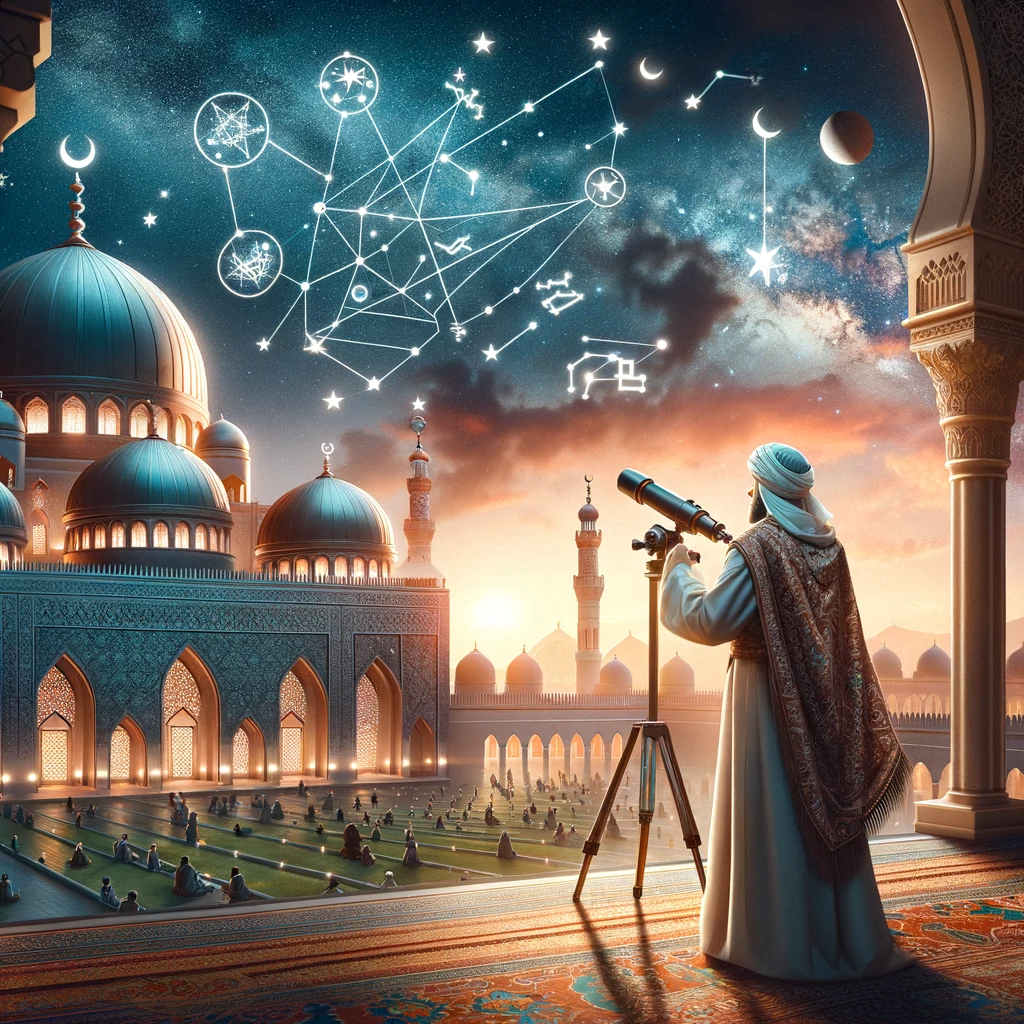
What Does the Hadith Say About Astrology?
While the Qur’an sets the foundation by making it clear that only Allah knows the unseen, the Hadith provides direct instructions from Prophet Muhammad ﷺ on how Muslims should approach fortune-telling, astrology, and similar practices. The Prophet not only warned against astrology but also connected it with serious spiritual consequences.
Prophet Muhammad ﷺ on Fortune-Telling and Astrology
The Prophet ﷺ strongly condemned those who sought knowledge of the unseen through fortune-tellers, including astrologers. He equated astrology with sorcery and magic—practices clearly forbidden in Islam.
- “Whoever acquires knowledge of astrology has acquired a branch of magic. The more he increases in it, the more he increases in magic.”
(Sunan Abu Dawood, Hadith 3905)
This hadith directly links astrology to sihr (magic), which is one of the greatest sins in Islam. Just like magic, astrology relies on claiming hidden powers that belong only to Allah.
Another powerful narration states:
- “Whoever goes to a fortune-teller and believes what he says has disbelieved in what was revealed to Muhammad.”
(Musnad Ahmad, Hadith 9532; Sunan Abu Dawood 3904)
In this narration, belief in astrology or fortune-telling is not just discouraged—it’s compared to outright disbelief (kufr). That demonstrates how seriously Islam views the matter.
Punishments or Warnings Regarding Astrology
Some Hadith also describe the spiritual consequences of engaging with astrologers and fortune-tellers.
- “The prayer of one who goes to a fortune-teller and asks him about something will not be accepted for forty nights.”
(Sahih Muslim, Hadith 2230)
This warning shows the seriousness of even visiting an astrologer, regardless of whether the person truly believes or not. The act itself is seen as undermining faith and wasting trust that should only be placed in Allah.
Why Hadith Are So Clear on This Issue
The Prophet Muhammad ﷺ lived at a time when Arabian tribes practiced forms of astrology and fortune-telling. By condemning these acts, the Prophet closed the door to potential shirk in the community. His teachings make it undeniable:
- Astrology is more than a “harmless hobby.”
- It puts a Muslim at risk of disbelief.
- Even casual belief or testing of horoscopes is a spiritual danger.
In summary:
- Astrology is equated with sorcery and magic.
- Visiting or believing astrologers is a major sin.
- Even small engagement with astrology is discouraged with strong warnings.
So when asked “Is astrology haram in Islam according to Hadith?” the answer is: Yes, both believing in and practicing astrology are forbidden, and they compromise a Muslim’s faith.
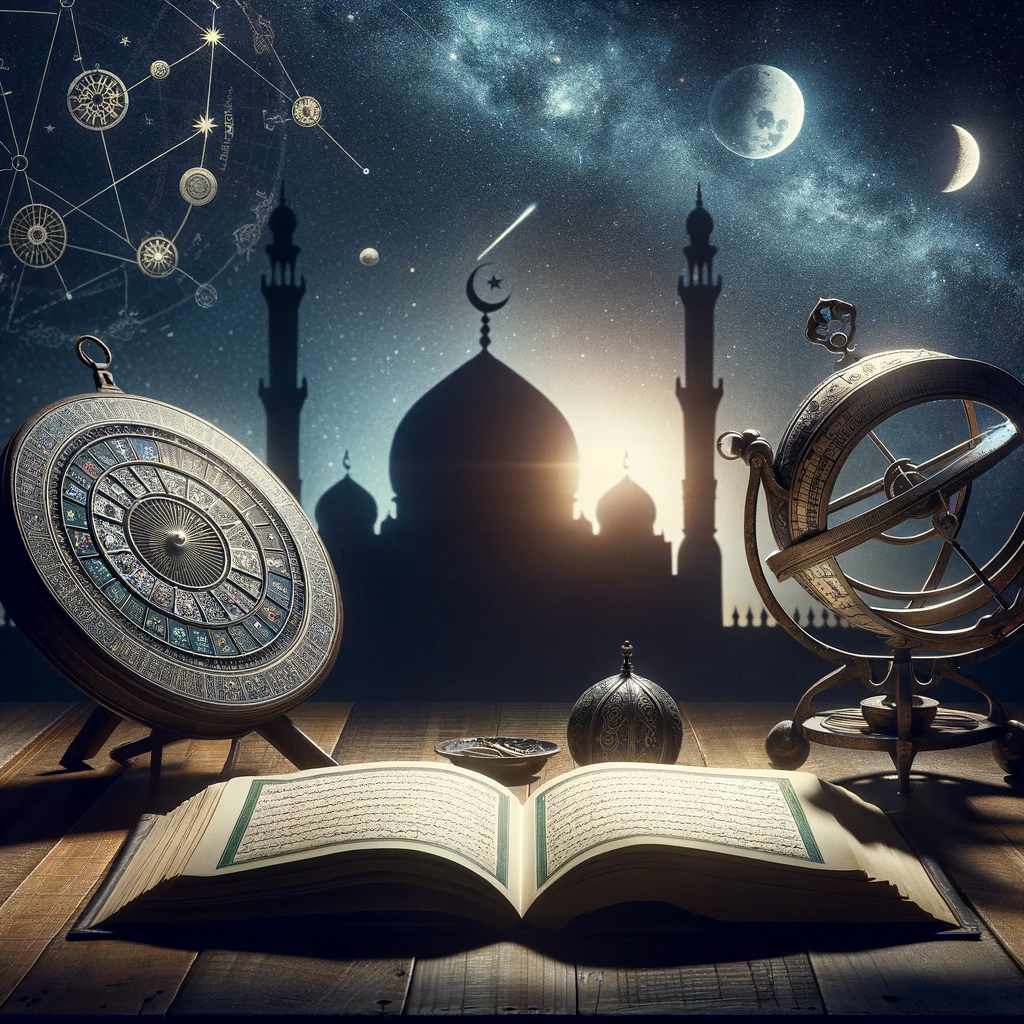
Scholars’ Opinions: Is Astrology Haram in Islam?
While the Qur’an and Hadith are clear on the matter, Islamic scholars throughout history have also extensively discussed astrology. They analyzed its practices, separated permissible knowledge from forbidden superstition, and warned Muslims against falling into shirk. The overwhelming scholarly consensus (ijma‘) is that astrology is haram.
Consensus of Islamic Scholars (Ijma’)
Scholars from all schools of Islamic thought — Hanafi, Maliki, Shafi’i, and Hanbali — agree that astrology in its predictive form is forbidden.
- Imam An-Nawawi (Shafi’i school): He stated that astrology that claims to predict the future or influence events is forbidden and a kind of shirk.
- Ibn Taymiyyah (Hanbali scholar): He declared astrology as categorically haram because it assigns powers to creation that belong only to Allah.
- Al-Qurtubi (Maliki scholar and Qur’an commentator): He explained that Qur’anic references to stars are for navigation and adornment of the skies, not for predictions.
Scholars make it clear: Astrology is not just wrong, it is a sin touching on disbelief (kufr).
Why Astrology is Linked to Shirk
Astrology directly conflicts with Islamic belief in Tawheed (Oneness of Allah) because:
- It attributes control over destiny to stars and planets instead of Allah.
- It claims knowledge of the unseen, which is exclusive to Allah.
- It makes people turn away from trust (tawakkul) in Allah, depending instead on horoscopes or astrologers.
For this reason, scholars classify astrology as a form of minor shirk (if seen as entertainment) or major shirk (if believed in fully). Both paths are spiritually dangerous.
Are All Forms of Astrology Haram?
Some Muslims wonder if it’s acceptable to read horoscopes “for fun” without really believing them. Scholars make important distinctions:
- Casual Reading for Fun:
Even if a person doesn’t believe in horoscopes, reading them for entertainment trivializes shirk and opens the door to temptation. Many scholars discourage this entirely. - Serious Belief in Astrology:
This is considered major haram and compromises a person’s faith. Taking astrologers’ words as truth contradicts belief in Allah’s supremacy and divine decree (Al-Qadr). - Scientific Astronomy vs. Astrology:
Astronomy (calculating lunar months, navigation, prayer times) is encouraged and even part of Islamic rituals. Astrology — even casually — is condemned.
Supporting Fatwas from Modern Scholars and Institutions
Contemporary Islamic authorities like Dar al-Ifta al-Misriyyah, Islam Q&A, and the Permanent Committee for Islamic Research and Fatwas (Saudi Arabia) all confirm:
- Astrology is not permissible in Islam under any form.
- Reading or following horoscopes is haram.
- Only astronomy for practical, scientific purposes is halal.
Sheikh Ibn Baz, a renowned modern scholar, summed it up:
“Astrology is falsehood. Believing in it is shirk, because it is claiming knowledge of the unseen which no one knows except Allah.”
In summary:
- There is absolute scholarly consensus that astrology is haram.
- The practice of astrology is dangerous because it leads to shirk.
- Even casual engagement with zodiac signs is considered sinful, not harmless.
So to the question, “Is astrology permissible in Islam according to scholars?” the answer is clear: No, astrology is not permissible in Islam — it is unanimously considered haram.
Why Do People Believe in Astrology Despite Islam’s Stance?
If astrology is so clearly haram in Islam, why do millions of Muslims (and non-Muslims alike) still read horoscopes, check zodiac compatibility, or follow astrologers on social media? The answer lies in human psychology, cultural influence, and our natural desire to make sense of life’s uncertainties.
Human Curiosity About the Future
From the beginning of history, humans have wanted to control or at least understand what lies ahead. Fear of the unknown is powerful—people long for reassurance about marriage, careers, health, and success. Astrology seems to offer quick answers.
In reality, this desire to know the future conflicts with faith in Allah’s Qadr (divine decree). Islam teaches that instead of chasing predictions, we should strengthen our tawakkul (trust in Allah) and accept that the future is His alone to control.
Cultural Influence of Astrology
Another reason people get pulled into astrology is cultural exposure.
- Magazines, newspapers, and now Instagram, TikTok, and YouTube are filled with horoscope posts and zodiac memes.
- Growing up in non-Islamic societies often normalizes astrology as “just part of popular culture.”
- Even in Muslim-majority countries, Western astrology apps and content spread quickly among younger audiences.
This constant exposure desensitizes people. What once may have been seen as shirk or haram gets reframed as “fun” or “trendy.”
Psychological Appeal of Horoscopes
Psychologists highlight something called the Barnum Effect (or Forer Effect). This refers to the human tendency to believe vague, general statements are unique to them. For example:
- “You sometimes feel anxious but know how to hide it.”
- “You value honesty but can be cautious when trusting others.”
These phrases can apply to almost anyone. But when written under a zodiac sign, people feel personally addressed, which tricks them into believing astrology is accurate.
In short: horoscopes work because they exploit human bias, not because they reveal truth.
Social Belonging and Identity
Modern-day astrology has also become a way for people to connect socially. Phrases like “I can’t date Scorpios”, “Virgos are perfectionists”, or “That’s such a Leo thing” are now part of everyday conversations. Astrological signs provide labels people use to describe themselves and others, giving a sense of identity and belonging.
But Islam warns against reducing a person’s worth to anything other than their faith, character, and deeds. As the Prophet ﷺ said:
“Verily, Allah does not look at your appearance or wealth, but He looks at your hearts and your deeds.”
(Sahih Muslim, Hadith 2564)
False Sense of Control
Astrology appears attractive because it promises control. If someone knows their destiny, they believe they can prepare or change it. But this undermines one of the fundamental Islamic beliefs: Qadr (divine predestination). Muslims are taught to trust Allah, seek guidance through prayer, and accept that some things are beyond human understanding. Astrology tries to replace that reliance on Allah with reliance on planetary alignments.
Islam rejects all of these reasons because they weaken faith and distract from the real source of guidance: the Qur’an and Sunnah.
People believe in astrology due to fear of the unknown, cultural influence, psychological tricks like the Barnum Effect, and social belonging.
Common Questions About Astrology in Islam
Even though Islamic ruling on astrology is very clear, many Muslims still have specific questions about whether certain practices are considered haram or if they fall into doubtful areas (shubuhat). Let’s address the most common ones.
Is Reading Your Horoscope Haram in Islam?
Yes. Even reading horoscopes for entertainment is not permissible in Islam. The Prophet ﷺ warned that even approaching astrologers is sinful, regardless of belief. A casual reading might seem harmless, but it normalizes shirk-influenced practices.
- Hadith: “The prayer of one who goes to a fortune-teller and asks him about something will not be accepted for forty nights.” (Sahih Muslim 2230)
- This shows that asking or engaging in such acts is sinful, even for fun.
Is Believing in Zodiac Signs Haram in Islam?
Absolutely. Believing that a person’s nature, destiny, or compatibility is controlled by their zodiac sign is shirk. In Islam:
- A person’s worth is judged by their deeds and faith, not their birth month.
- The Qur’an rejects false systems that claim to know the unseen.
So, saying “I don’t get along with Scorpios” based on astrology is against Islamic teachings.
Can I Read Astrology “Just for Fun” Without Believing It?
Many people defend astrology as mere “entertainment.” However, scholars warn that trivializing shirk-related practices is dangerous.
- It can gradually lead to belief (waswasah — whispers of Shaytan).
- Casual reading may expose the heart to doubt, especially in times of weakness.
Islam encourages keeping hearts and minds free from even light association with haram practices.
Is Astronomy (Scientific Study of Stars) Halal in Islam?
Yes. Astronomy is completely different from astrology, and it’s encouraged in Islam. Astronomy helps calculate prayer times, Ramadan, Hajj, and navigation. It’s beneficial knowledge firmly rooted in observable science.
Astrology = Harām superstition
Astronomy = Halāl science
Is Using Astrology for Marriage Compatibility Allowed?
No. Marriage compatibility in Islam is based on iman (faith), character, deen (religious practice), and values, not star signs.
The Prophet ﷺ emphasized:
“A woman is married for four things: her wealth, her lineage, her beauty, and her religion. So marry the religious woman, or you will lose.”
(Sahih al-Bukhari, Sahih Muslim)
Using zodiac signs for marriage choices ignores what really matters in Islam.
What’s the Difference Between Astrology and “Ilm al-Nujum” in Islam?
Historically, Arabs practiced something called ‘Ilm al-Nujum (knowledge of the stars). Scholars distinguished:
- Permissible Ilm al-Nujum: Using stars for navigation and timekeeping.
- Forbidden Ilm al-Nujum: Using stars to predict unseen events or claim destiny.
Thus, only the scientific, practical side of astronomy is halal. The predictive side is what Islam condemns.
Quick Recap Table
| Question | Ruling in Islam |
|---|---|
| Reading horoscopes | Haram |
| Believing in zodiac signs | Haram / Shirk |
| Reading astrology “for fun” | Discouraged (haram) |
| Studying astronomy (science) | Halal / Encouraged |
| Using astrology for marriage compatibility | Haram |
| Islamic “Ilm al-Nujum” (navigation astronomy) | Halal |
Consequences of Practicing Astrology in Islam
Astrology may seem like harmless entertainment on the surface, but Islam warns that engaging with it comes with serious spiritual consequences. It doesn’t just affect one’s faith; it also influences mental well-being, decision-making, and even relationships. Let’s break down the impact.
1. Spiritual Consequences
The spiritual risks are the most severe, because astrology directly interferes with the foundation of Islam—Tawheed (Oneness of Allah).
- Risk of Shirk (Associating Partners with Allah):
Astrology attributes divine powers to the stars, which is shirk. Even minor belief in horoscope predictions weakens a Muslim’s Tawheed. - Undermining Trust in Allah (Tawakkul):
Instead of relying on Allah for guidance through prayer, dua, and Istikhara, a believer who trusts astrology places their heart in created stars and planetary alignments. - Invalidation of Worship:
Prophet ﷺ warned that visiting astrologers or fortune tellers makes prayers unacceptable for 40 days (Sahih Muslim 2230). That means a Muslim loses the reward of their salah—one of the pillars of Islam. - Path to Kufr (Disbelief):
Believing wholeheartedly that astrology controls destinies is a form of disbelief, because it denies Allah’s sole control over the unseen.
2. Psychological Consequences
Astrology can quietly plant seeds of anxiety, fear, and false hope.
- Dependence on Horoscopes: People begin to rely on daily horoscopes or zodiac readings before making decisions. For example, choosing not to travel because it’s a “bad day according to the stars.”
- False Sense of Control or Doom: Astrology can convince people that their future is already cursed or blessed by planets, causing stress or arrogance.
- Loss of Clarity: Instead of making decisions using reason, faith, and shura (consultation), a person may blur their judgment with vague astrological claims.
3. Social and Relationship Consequences
Astrology also negatively affects how people interact socially and within relationships.
- Astrological Compatibility in Marriage: Some reject marriage proposals based on zodiac matches, which Islam rejects. Compatibility should be based on religion, character, and mutual respect—not stars.
- Stereotyping People: Saying things like “He’s stubborn because he’s a Taurus” reduces a person’s entire character to a vague label. Islam teaches judging people only by their deeds and piety.
- Creating Conflict: Relying on astrology as a measure of relationships can create unnecessary distrust or conflict.
4. Long-Term Consequences
- Weakened Faith: Regular exposure and belief in astrology can slowly distance a person from Quranic guidance.
- Slippery Slope to Other Haram Acts: History shows that astrology often leads to practices like magic, divination, or palmistry—each one pulling a Muslim further from Tawheed.
- Loss of Barakah (Blessing): Since barakah comes from full submission to Allah, reliance on haram practices can remove blessings from wealth, relationships, and life.
The consequences of practicing astrology are not lighthearted—they involve shirk, weakened faith, psychological harm, social distortion, and loss of blessings. What may start as “fun” can lead to very serious damage in this life and the next.
What Should Muslims Do If They’ve Practiced Astrology?
Many people, often out of ignorance or exposure to popular culture, have read horoscopes, believed in zodiac signs, or even visited astrologers at some point. In Islam, no sin is too great to be forgiven if one sincerely repents. Allah’s mercy is vast, and He repeatedly reminds us that He forgives all sins except shirk if one dies upon it without repentance (Surah An-Nisa, 4:48).
So, what steps should a Muslim take if they’ve practiced or believed in astrology?
1. Repentance (Tawbah) for Believing in Astrology
Repentance in Islam means much more than simply saying “Astaghfirullah.” It has clear conditions that help a believer cut ties with sin:
Steps of sincere repentance (Tawbah):
- Stop Immediately — cease engaging in astrology (stop reading horoscopes, following astrologers, etc.).
- Feel Genuine Regret — recognize that engaging in astrology is a sin and feel sorrow for undermining trust in Allah.
- Seek Forgiveness — make constant istighfar (asking forgiveness) and dua for cleansing the heart.
- Make a Firm Intention Not to Return — commit sincerely never to repeat this act.
This four-step process is supported by the Hadith:
- “The one who repents from sin is like one who has no sin.” (Sunan Ibn Majah 4250)
2. Strengthening Faith in Allah’s Decree (Qadr)
Astrology often comes from a desire to know the unknown. The antidote is to reinforce belief in Qadr (Divine Decree): everything happens by Allah’s wisdom and will.
Ways to strengthen this belief:
- Frequently Recite Quran Verses about Qadr, such as Surah Al-Hadid (57:22):
“No calamity befalls on the earth or in yourselves but it is inscribed in the Book before We bring it into existence…” - Understand Tawakkul (Trust in Allah): Make a conscious effort to rely on Allah in decision-making instead of superstition.
- Reflect on Allah’s Mercy and Wisdom: Remember that Allah knows what we do not, and everything happens for a reason rooted in divine wisdom.
3. Replace Astrology with Halal Alternatives for Guidance
Many who turn to astrology do so because they seek guidance and clarity in life. Islam offers pure and reliable alternatives:
- Dua (Supplication): Directly asking Allah for help whenever in doubt.
- Istikhara Prayer: A special prayer the Prophet ﷺ taught when making big decisions. It’s essentially seeking Allah’s guidance while leaving matters to His wisdom.
- Consultation (Shura): Asking advice from people of knowledge, trusted friends, or scholars.
- Seeking Knowledge: Engaging in Islamic studies to better understand life through the Qur’an and Sunnah.
4. Protecting Oneself from Falling Back Into Astrology
Since astrology is everywhere—apps, memes, magazines—it’s easy to fall back. Some practical steps to protect oneself include:
- Unfollowing Astrology Accounts on social media.
- Keeping Good Company: Surround yourself with friends who remind you of Allah rather than fads.
- Educating Others: Once you know the truth, advise gently against astrology within your circle.
- Replacing Habits: Instead of checking horoscopes, read inspirational Qur’anic tafsirs or du’as daily.
Key Takeaway:
If someone practiced astrology, the path forward is simple but essential: Repent sincerely, reaffirm trust in Allah alone, and replace harmful practices with Islam’s guidance-based alternatives.
Allah says:
“Say, ‘O My servants who have transgressed against themselves [by sinning], do not despair of the mercy of Allah. Indeed, Allah forgives all sins. Indeed, it is He who is the Forgiving, the Merciful.’”
(Surah Az-Zumar, 39:53)
Final Thoughts: Is Astrology Permissible in Islam?
After examining the Qur’an, Hadith, scholarly consensus, and the negative consequences of astrology, the verdict is clear: Astrology is not permissible in Islam.
- The Qur’an reminds us that only Allah has knowledge of the unseen (al-Ghayb).
- The Hadith directly condemns astrology, equating it with sorcery (sihr) and warning that even visiting astrologers without belief invalidates worship for 40 days.
- Islamic scholars, both classical and contemporary, unanimously agree that astrology is haram, whether taken seriously or “just for fun.”
Why Is Astrology Forbidden in Islam?
- It gives power to creation (stars, planets) instead of the Creator (Allah).
- It undermines Tawheed, the foundation of Islam.
- It risks pulling a believer into shirk or disbelief.
- It shifts reliance away from Allah’s decree and towards superstition.
What Muslims Should Do Instead
Rather than seeking answers from horoscopes and zodiac signs, Islam provides pure and beneficial ways to gain clarity in life:
- Dua for direct connection with Allah.
- Istikhara prayer for life decisions.
- Shura (consultation) with trusted advisors.
- Reflection on the Qur’an and Sunnah for long-term guidance.
The Final Answer
So, to the main question—Is astrology permissible in Islam?
The answer is an unambiguous No. Astrology is considered haram because it contradicts the Oneness of Allah and attempts to claim knowledge that belongs only to Him.
As believers, we are called to place our full trust in Allah, not the movements of the stars. A Muslim’s peace and strength come from accepting Allah’s divine wisdom—not from horoscopes or superstitions.
“And upon Allah let the believers rely.”
(Surah At-Taghabun, 64:13)
Perfect — let’s close the article with a comprehensive FAQ section that addresses quick, common doubts in a clear and SEO-friendly way.
Frequently Asked Questions (FAQ)
1. Why is astrology haram in Islam?
Astrology is haram because it claims knowledge of the unseen (al-Ghayb), which belongs only to Allah. It also gives power to stars and planets rather than Allah, which risks falling into shirk. Both the Qur’an and Hadith strongly warn against believing in or practicing astrology.
2. Can Muslims believe in zodiac compatibility for relationships?
No. In Islam, marriage compatibility is based on faith, character, and piety, not zodiac signs. Using star signs to judge compatibility is invalid and haram. The Prophet ﷺ said character and religious commitment are the deciding factors in marriage.
3. Is there something called Islamic astrology?
No, there is no such thing as “Islamic astrology.” Islam allows astronomy (scientific study of stars for calendars, navigation, prayer times), but astrology (predicting destiny, personality, and future events from stars) is strictly forbidden.
4. Is astronomy encouraged in Islam?
Yes. Astronomy is considered a halal science and even necessary for acts of worship like determining prayer times, starting Ramadan, and guiding travelers. Muslim scholars historically made great contributions to astronomy—but they always separated it from astrology.
5. What is the punishment for believing in astrology?
The Prophet ﷺ warned that anyone who visits a fortune teller (including astrologers) loses the reward of prayer for 40 days (Sahih Muslim 2230). If someone fully believes that astrologers know the unseen, it can even lead to kufr (disbelief). For this reason, Islam guides believers to immediately repent (tawbah) when they fall into astrology.
6. Is reading astrology “for fun” still haram?
Yes. Even reading horoscopes casually without belief is haram because it involves engaging in a practice linked to shirk. Scholars warn that such habits can slowly influence belief, weaken tawakkul (trust in Allah), and open the door to major sins.
7. What should I do if I used to follow astrology?
Repent sincerely, ask Allah for forgiveness, and stop engaging in astrology completely. Strengthen faith in Allah’s Qadr (divine decree) and replace astrology with Islamic alternatives like dua, Istikhara, and Qur’an reflection.
